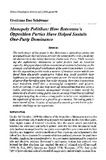Monopoly politikos: How Botswana's opposition parties have helped sustain one-party dominance

View/
Date
2006Author
Selolwane, O.
Publisher
African Sociological ReviewType
Published ArticleMetadata
Show full item recordAbstract
The main thesis of this paper is that Botswana's opposition parties are accountable for their failure to provide the voting public with a meaningful alternative to the ruling Botswana Democratic Party. While conceding the explanatory importance of other factors such as resource capacity, this paper departs from conventional wisdom by focusing on the strategic and ideological weaknesses of the opposition parties. it argues that the opposition parties made a number of strategic errors which rendered them electorally unattractive before they could establish their legitimacy as contenders for government power. To break the monopoly of power that the ruling party has so far enjoyed, Botswana's opposition must transform itself into a meaningful competitor and government-in-waiting. To do that they must (a)demonstrate that they have a viable, alternative economic management strategy to better satisfy the interests of a diverse voting public and (b)develop broad based political strategies targeting the diverse voting public to build voter confidence in the capability of the party as a possible government. The ruling party's track record of four decades of sustained economic growth leaves a formidable challenge to the opposition.
